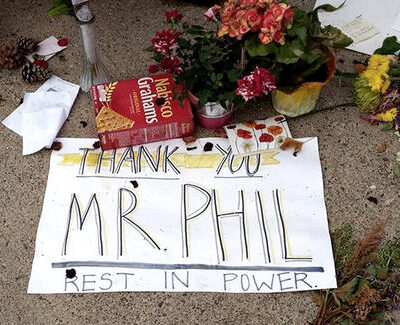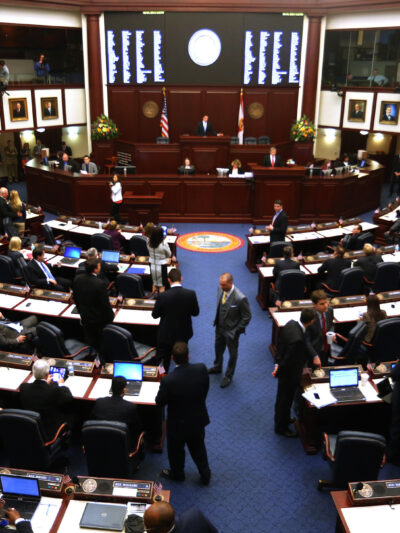News & Commentary
Philando Castile’s fate could have been my fiancé’s
Can you imagine what it is like to wake up every day in fear, knowing today could be the last you see your fiancé because of the color of his skin?As an African American woman, I constantly live in fear my fiancé or myself will not make it home to one another every night.I fear that one of us will be stopped by the police for a broken taillight and shot down in fear, like Philando Castile. I fear one of us will be gunned down after heading to the convenience store for skittles, like Trayvon Martin. I fear we will be out together, enjoying our evening, and one of us will be shot down for laughing, like Rekia Boyd. I fear I will call upon a neighbor for help after being in an accident and be shot down, like Renisha McBride. I fear my fiancé will be out celebrating with friends the night before our wedding, and be executed because a cellphone was mistaken for a gun, like Sean Bell.I am afraid that because of how I look, I too could be executed regardless of the circumstances.

Florida—State of the Death Penalty
Michael Lambrix was supposed to die today.
Three months ago his death warrant was signed by Governor Rick Scott. Michael was moved to a special “Death Watch” cell, steps from the execution chamber. He was fitted for his burial suit and was visiting with his friends and family for what he assumed would be the final time.
However, thanks to the recent ruling from the United States Supreme Court that Florida’s death penalty statute is unconstitutional, Michael was allowed to challenge his sentence. Attorney Brian Stull of the ACLU Capital Punishment Project was among those who filed a brief on behalf of Michael. Last week the Florida Supreme Court agreed to a stay of execution while they sort out the question of which death row inmates might be entitled to a new sentence.
New Evidence Suggesting Racial Profiling on Florida Roadways
By Nusrat Choudhury, Staff Attorney, ACLU Racial Justice Program
Updated below
Sam Dubose. Walter Scott. Sandra Bland. 2015 showed in terrible and vivid detail how even routine police traffic stops carry the risk of escalating to arrest or the use of force — even lethal force. Traffic stops are not simply innocuous encounters. They can be deadly, particularly for Black people.
When evidence suggests that certain communities are targeted for traffic stops because of their race or ethnicity, we need to take heed. Today the ACLU is releasing a report providing just that. “Racial Disparities in Florida Safety Belt Law Enforcement” is the first report to analyze publicly available seat belt citation data reported by law enforcement agencies across the state to the Florida Department of Highway Safety and Motor Vehicles in 2014 and 2011.
By Guest Blog
Attn: Florida Legislature: Immigrants Have Rights
As Tallahassee gears up for the 2016 legislative session, which starts on January 11, anti-immigrant bills have already started rearing their ugly heads.
Towards the end of the summer, Representative Carlos Trujillo (R-District 105) filed a bill (HB 9) that would criminalize immigrants by making it a first degree felony for a person to be knowingly present in the state of Florida after receiving a final deportation order. If this bill were to become law, violations are punishable by up to 30 years in prison and $10,000 in fines. Senator Travis Hutson (R-District 6) filed the companion bill (SB 118) in the senate.
Under the U.S. Constitution, the federal government has jurisdiction over immigration policy. The act of being present in the U.S. in violation of immigration laws, even after an order of deportation, is not an actual crime, despite the “criminal alien” rhetoric.

‘Home’ Is Not Where You Are Involuntarily Confined
By Sean J. Young, Staff Attorney, ACLU
Earlier this week, The New York Times published a column asserting that the American Civil Liberties Union has “seemed to take “opposite position[s]” in two voting rights disputes. This is wrong.
In the first dispute, which is pending before the Supreme Court, the question is whether states should be allowed to count all persons for the purposes of equally apportioning their legislative districts, as nearly all states currently do. The ACLU filed an amicus brief answering yes, for our country has long embraced the fundamental principle that all persons, whether or not they can vote, are entitled to equal representation. Given the democratic values of inclusion and equality built into the Constitution, we reject our opponents’ argument that this same Constitution now forces all states to exclude all ineligible voters from their population counts. Millions of non-citizens are contributing members of our communities, and the vast majority of states that currently provide these individuals the same share of representation that citizens receive should be allowed to continue doing so.
By Guest Blog- ACLU National

Rights Restoration is Still a Problem in Florida
By: Jessica Chiappone, Florida Rights Restoration Advocate
In 1988 I was arrested and subsequently convicted of conspiracy to possess cocaine in New York. Since my release from prison over 15 years ago my right to vote was automatically reinstated pursuant to New York law. In 2007, I moved from New York to Florida. However, my right to vote was not acknowledged by full faith and credit in Florida because pursuant to Florida’s Constitution, a citizen cannot vote unless their “rights” are restored. Florida is one of three states that permanently disenfranchises individuals due to a past felony conviction. The other two states are Kentucky and Iowa.
By Guest Blog

TIMELINE: Celebrating 50 Years of the ACLU of Florida
This year, the ACLU of Florida is celebrating its 50th anniversary. That’s half a century of defending the rights and freedoms of Floridians.
This timeline examines some of the most significant cases and historic moments in the history of the organization:
1965 – Founding: In response to the anti-Communist scare of the era, ACLU chapters in Miami, Gainesville and Tampa join together to form the ACLU of Florida. As described in the original 1965 charter, the organization’s mission will be “To uphold the guarantees of freedom of speech, press, assembly, religion, and thought, as provided in the United States Constitution and the Bill of Rights and to uphold the Florida State Constitution and Declaration of Rights; to uphold due process of law and equal protection under the law as provided by the Constitution; to encourage an appreciation of our basic liberties; to perpetuate, through a program of education and positive action, respect and devotion for freedom and liberty.”
By admin

An Intense Spring in Tallahassee
ACLU in the House!...and Senate.
With the support of your activism, the ACLU of Florida defeated a number of bad bills this legislative session and amended others to minimize the damage to civil rights and liberties in our state. We thank you for exercising your rights and standing up for the constitution. We logged over 15,000 legislative contacts this session, lobbied legislators and committees, and collected 10s of thousands of petition signatures. Here’s what we were able to accomplish at the state capitol for the 2015 legislative session:

Racism Overwhelming the Miami Beach Police Department, and Our Communities
The release of racist, sexist, and homophobic emails primarily authored by two Miami Beach police officers (who have since left the Police Department), further exposes the level of bigotry and violent mentality endemic within the Department. The news regarding the emails also occurred as the City prepares for Urban Beach Weekend, an annual Memorial Day celebration similar to Ultra Music Festival and Pride that attracts thousands of mostly young black adults.
For several years, the ACLU has been meeting with Miami Beach police officers and other city officials to discuss the complaints from visitors and residents about the City’s over-policing during that weekend – heightened presence of police officers everywhere, use of dogs, flood lights, and DUI checkpoints which are almost never used any other weekend. Raymond Martinez, the former police chief, even sat in on some of those meetings and acted as if he saw no problem with his department’s treatment of black youth. All the while, he was one of the main recipients of these emails. Whether receiving these emails caused him chagrin or amusement, we know for certain that, as the head cop in charge, he did absolutely nothing to end this behavior or to punish those who were in direct violation of departmental policies.

Stay Informed
Sign up to be the first to hear about how to take action.
By completing this form, I agree to receive occasional emails per the terms of the ACLU’s privacy statement.
By completing this form, I agree to receive occasional emails per the terms of the ACLU’s privacy statement.
